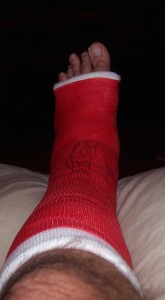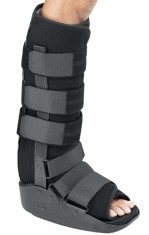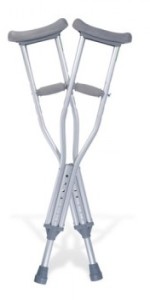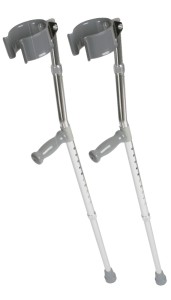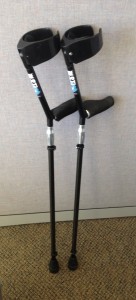 The familiar and tiresome conversation.
The familiar and tiresome conversation.
The other day as I was heading to the parking garage elevators, a man getting on ahead of me noticed I was heading that way and kindly held the doors so I could make that car. As I entered he said “is that a knee injury? I injured my knee once, and using crutches sucked.” Now faced with providing him an answer, I had to make a choice to go along with the injury theory or explain that the crutches were permanent. I chose to just say “ankle” and hoped that would satisfy his curiosity. Yeah, no such luck! Next came the dreaded words, “I bet you can’t wait to ditch the crutches?”
What happened on the elevator is an everyday occurrence. Questioning and comments similar to those of the man in the elevator have become a daily part of my life, leaving me thinking that there should be a book out there on etiquette to talking to strangers on crutches. That evening I did a quick Google search for books on Etiquette, which gave me 1000’s of results. Here’s just a few of the more interesting titles I found: Etiquette for Dummies, A Gentleman’s Guide to Etiquette, How Not To Be a Dick!: An Everyday Etiquette Guide, Don’t Forget Your Etiquette!: The Essential Guide to Misbehavior and The Official Book of Electronic Etiquette. I won’t bore you with any more titles, but you get the point – there are a lot of books out there on the subject of etiquette. Yet in my search I didn’t find the etiquette book I was in search of: Crutch Talk Etiquette: The Official Guide to Making Small Talk With a Person Using Crutches.
I know this title might sound crazy, and you’re probably thinking “What do I need to know about making small talk with someone on crutches?” You ask what happened, how long the recovery will be and then sympathize with them about how difficult it must be to get around on crutches, right? No, no, no – you just stuck your foot in your mouth if that person on the crutches is a permanent crutch user. How are you going to feel when they answer “This isn’t an injury. I use crutches permanently”? Oh yeah, now how do you feel? Pretty uncomfortable, right? We don’t feel so good either. Those of us who walk with crutches full time don’t want to hear all the crutch horrors. The crutches are how we navigate through our everyday lives. We don’t need sympathy, as our crutches are what allows us to get out and live. We are just making our way through a normal day and really don’t appreciate commentary or interrogations about our crutches.
The problem: When people see crutches they assume ‘temporary leg injury’. What the average person knows about crutches is that they are associated with injury, pain and recovery. So, they feel bad and compelled to say something. It’s a gesture of kindness that results in making the asker uncomfortable and the crutch user feel like their crutches are all people see.
So, here it is: Darryl’s edition of Crutch Talk Etiquette: The Official Guide to Making Small Talk With a Person Using Crutches. Well, it’s not really a book, just my list of 10 things not to say to a stranger using crutches, followed by some friendly advice for the next time you cross paths with a stranger on crutches.
My List of 10 Things Not To Say To A Stranger Using Crutches
Be advised that I have added some snarky responses for your amusement. I don’t respond this way unless they really get on my nerves.
- I had to use crutches once and they were more painful to use than walking on the injury. I get this one all the time. Seriously, I once had a lady go on and on about how painful two weeks of using crutches for a sprained ankle was. This was after telling her my crutches were permanent. I was trapped on the elevator with her, so I just stood there staring at her while she babbled on about how miserable crutches were to use until the elevator stopped at her floor. As she left she was still babbling down the hall. My crutches cause me zero pain in my normal daily routine and telling a full time crutch user these things just isn’t cool!
- You must have really sore hands and arms. As a full time crutch user my hands and arms have become accustomed to bearing my body’s weight. So, along with proper grip pads and crutch tips, my hands and arms have zero pain from normal daily use. I have had a few people who were currently using crutches ask how I handled the hand pain. I have no problem with that; in fact, I enjoy helping someone out with their crutches. Once again, even if my hands and arms were sore I don’t need a stranger who’s not using crutches constantly pointing this out.
- It must be exhausting walking on crutches. Yes, using crutches can quickly fatigue you, however like training for running you get to a point where you can go a certain distance with little effort. It’s the same with using crutches – once you are trained to go your normal daily distance, it is no more effort than walking. With this said, yes I get fatigued quickly when I have to walk longer than normal distances and prefer not being reminded of this by a stranger who has two healthy legs.
- How much longer will you need the crutches? “It’s a life sentence!” This one backfires on them when I answer honestly. There was a time when I would spare them by skirting around the question. At this point I figure hey, it’s me using the crutches, so why should I worry about sparing them by not telling the truth?
- Crutches really suck! “Thank you for telling me that!” Crutches might suck but without them I can’t get around, so to me they don’t suck. What sucks is that people would express negative remarks to me about something I need to walk.
- How’s the foot/leg coming along? “No place for it to go!” Once again this one only serves to make them uncomfortable when I inform them that this is a permanent condition.
- Is your leg broken? “Permanently!” No, my leg is not broken, and there are many other reasons for needing crutches. So unless you see a cast on my leg, consider I might require crutches for a different reason.
- I feel your pain, I twisted my knee the other day. “Are you F…ing kidding me?” This is just pain ignorance – until they have gone through 6 surgeries and used crutches for 6 years they can’t possibly feel my pain.
- I bet you can’t wait to get off the crutches. “It will be a long wait!” How do I respond to this? All I can really say is that they are permanent, and then the asker becomes silent and avoids any further eye contact.
- Hope your leg heals soon! “Are we expecting miracles?” Once again, what can I say that isn’t going to make them feel bad that they said anything?
So here’s the thing folks – making small talk about a stranger’s crutches might just put them in an uncomfortable position to answer and put you in an uncomfortable position of hearing their answer. I try to soften the blow by quickly explaining that it is okay, the crutches are just a part of my daily life. Unfortunately these statements and questions can become very tiresome and can get the best of me. It would be wonderful to never hear them. I have often said that all I want to do is be a father supporting my children by attending their school events, just like any other parent, and not have to be interrogated about my crutches.
My advice before commenting on a stranger’s crutches:
- Are they using crutches temporarily due to injury/surgery or are the crutches permanent due to a disabling condition?
How can someone know if your crutches are permanent or temporary? There are a few things that could help a stranger out with this.
If the crutch user is not wearing a cast, bandaging, or one of those big black boots used for injuries, then assume the crutches might be permanent and choose not to make small talk about them.
If you are in the United States underarm crutches are the standard kind issued by doctors and hospitals for leg injuries. Forearm crutches are most typically used by full time crutch users.
The crutch user’s comfort level and proficiency can be a clear indicator. Temporary crutch users tend to appear more uncomfortable and awkward due to lack of practice. Permanent crutch users generally appear comfortable and confident in their crutch mobility.
A temporary crutch user is also more apt to show frustration and even express it by saying something like, “Man, this really sucks” when confronted by strangers. A full time crutcher is going to appear as if everything is normal.
General rule of thumb – don’t mention a stranger’s crutches unless there is a clear injury. Consider making the same small talk you would with someone not using crutches.
Just as a pair of eye glasses help us see, a pair of crutches help us walk. If you wear eye glasses, imagine what it would be like to have your eye glasses questioned everywhere you went.
Thank you for reading! Please subscribe and never miss a new post or visit again in two weeks. You can also follow livinglifeoncrutches on Facebook and Twitter.
